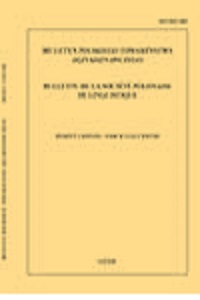Das Phänomen der Perspektive in der Sprachwissenschaft und seine literaturwissenschaftliche Dimension
The phenomenon of perspective in linguistics and its role in literary studies
Author(s): Michail L. KotinSubject(s): Semantics, Theory of Literature, Stylistics, Sociology of Literature
Published by: Polskie Towarzystwo Językoznawcze
Keywords: perspective; diegesis; epistemic modality; evidential modality; theory of mind;
Summary/Abstract: The aim of this contribution is an analysis of the category of perspective and the special features of its functioning in narrative literary texts. The spotlight is the problem of the “adjustment of knowledge” between text issuer and text recipient based on the assumptions of the Theory of Mind and the concept of multi-perspective text structures, in which the positions of text author, narrator and narration are defined according to the so-called triangular principle. The methodological basis are, on the one hand, the methods of linguistic analyses of sentences and texts (analyses of the semantics and syntax of language units, investigations in contexts, functional grammar analyses in synchronic and diachronic perspectives, as well as the methods used in discourse linguistics) and, on the other, the methods of literary analyses, first of all concerning the diegetic studies of a fictional narrative text. There are two types of units analysed in this paper, namely modal verbs and – from a diachronic point of view – verba dicendi in the function of indicators of epistemic or evidential modality in fictional narrative texts. The empirical sources are narrative texts written in New High German (E.T.A. Hoffmann, Fr. Kafka) and Old High German (the oldest, conceptually oral texts: Das Hildebrandlied, Muspilli, Wessobrunner Schöpfungsgedicht). We analyse examples that include modal verbs of epistemic or evidential semantics. Following the concept of triangularity, we differentiate between the perspective of the observer of the relation of narrator and narration (i.e. the deictic position of the author of the text), and the perspective of the observer of the object (i.e. the deictic position of the narrator as a fictional figure introduced by the author). The main conclusions are as follows: (i) the category of perspective creates a common field of linguistic and literary analyses; (ii) correct interpretation of a literary text depends on the definition of the perspective in question, both in literary and linguistic analyses; (iii) the Theory of Mind is a common dominator in both types of analyses; (iv) text classes (types) are a superordinate criterion in investigations concerning the perspective. The text types are, however, not static. The canons of using epistemic or evidential signals as indicators of the deictic perspective of both observers are a result of historical development. It coincides with the stages of the acquisition of interpretations in ontogenesis.
Journal: Biuletyn Polskiego Towarzystwa Językoznawczego
- Issue Year: LXXIX/2023
- Issue No: 79
- Page Range: 225-237
- Page Count: 13
- Language: German

